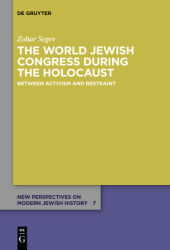 Neuerscheinungen 2017Stand: 2020-02-01 |
Schnellsuche
ISBN/Stichwort/Autor
|
Herderstraße 10
10625 Berlin
Tel.: 030 315 714 16
Fax 030 315 714 14
info@buchspektrum.de |

Zohar Segev
The World Jewish Congress during the Holocaust
Between Activism and Restraint
2017. 230 mm
Verlag/Jahr: DE GRUYTER; DE GRUYTER OLDENBOURG 2017
ISBN: 3-11-055402-X (311055402X)
Neue ISBN: 978-3-11-055402-1 (9783110554021)
Preis und Lieferzeit: Bitte klicken
The peer-reviewed series seeks to provide an international platform for new approaches to the study of modern Jewish history. Covering the period from the Enlightenment to the 21st century, the series focuses on cutting-edge work in social, cultural, economic, and political history. It seeks to explore new avenues in the understanding of modern Jewries in their historical contexts, encouraging a multi-layered exploration of topics which transcend the analytical boundaries of ethnicity, nation, and religion. The series embraces monographs and challenging research-oriented anthologies dedicated to a deeper understanding of essential themes in the main fields of Jewish studies, such as Jewish thought, migration, biography, Israel and the Middle East, Holocaust studies, the history of memory, and identity.
Drawing on hitherto neglected archival materials, Zohar Segev sheds new light on the policy of the World Jewish Congress (WJC) during the Holocaust. Contrary to popular belief, he can show that there was an impressive system of previously unknown rescue efforts. Even more so, there is evidence for an alternative pattern for modern Jewish existence in the thinking and policy of the World Jewish Congress. WJC leaders supported the establishment of a Jewish state in Palestine but did not see it as an end in itself. They strove to establish a Jewish state and to rehabilitate Diaspora Jewish life, two goals they saw as mutually complementary. The efforts of the WJC are put into the context of the serious difficulties facing the American Jewish community and its representative institutions during and after the war, as they tried to act as an ethnic minority within American society.
Zohar Segev, Dept. of Jewish History, University of Haifa, Israel.


